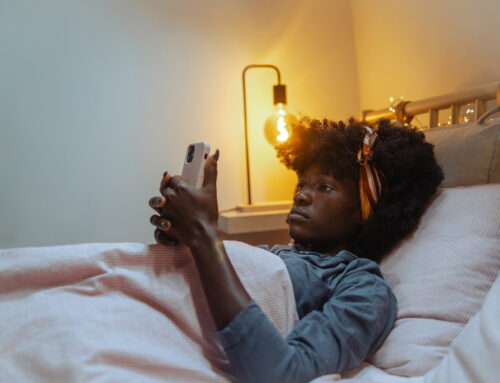In March 2020, many people thought that the pandemic would end in a few weeks. Then months. Then, by the winter, right? Surely, when a vaccine was created… or distributed. What about after boosters?
But the light at the end of the tunnel seems to keep moving further away. With the announcement of the Omicron variant, this feeling of futility returned with new force right before the new year.
We’re coming onto two years since the official declaration of a pandemic, and these months of uncertainty and rapid change — on top of widespread grief and loss — can weigh heavy on us. You might be realizing how much this prolonged unpredictability is getting to you.
We love certainty. There’s no doubt about it. Certainty allows us to plan ahead: This afternoon will be rainy; hence I will carry my umbrella. Next week will be snowy; hence I will bring out my winter coat. But what if there was no forecast to predict when the sun would shine, or when the rain would end?
Not knowing what will come next can create a sense of anxiety in us. It might feel like you’re tip-toeing across thin ice, blindly guessing where the ground can carry our weight. It might feel like you’re walking blindfolded through a maze, but you have no idea how big the maze is.
Wouldn’t it be easier if you had a map?
Well, sometimes the world can’t give us a map. With the coronavirus, though there is a global array of experts working tirelessly to try to predict, and end, this pandemic — there is still a lot we can’t foretell. For as long as that’s the case, here are some coping mechanisms to help guide you through times of prolonged unpredictability:
Accept that there are things you can’t control
The pandemic may have taken some parts of your predictable routine, and thrown them out of orbit — driving to work with the same radio station, perhaps, or heading for your daily gym session. Having something so fundamental to your weekly routine suddenly become unpredictable can be tough.
Unpredictability in the pandemic might look like your child for months raving about their excitement over finally having a normal school semester — but a week before the first day back, hearing that the semester is delayed. Or that you’re finally heading home to spend New Year’s Eve with your extended family — but at the last moment, your parents decide against it to be
extra safe. Maybe you finally bought a gym pass, but your gym is no longer opening as planned. Or your best friend’s wedding gets pushed for the third time.
Here is a recommendation that is a little hard to swallow, but will certainly help with your coping through the pandemic: Accept that there are things you can’t control.
That doesn’t mean give up and accept defeat. It only means that we must realize that no matter how much we plan for something, how hard we work for something, or how hard we want something — some things just aren’t possible right now. That’s a liberating feeling. You don’t need to blame yourself or anyone else, for these strings of cancellations or pushed dates or less-than-perfect outcomes. Instead, we must accept our lack of complete control, and work around it.
Understand, and take charge, of what is in your control
But even though the pandemic has taken many things out of our control, there are still some things that we can count on.
It might even be helpful to list them out: your daily walk, the meal you choose to cook for dinner, the people you choose to reach out to by text, the time you aim to go to sleep, for example.
You can count on yourself to be a good friend, to make the best decisions for yourself in the moment, and to cut yourself some slack. Yes, the pandemic has altered and restricted a lot of how we would usually spend our time — but it’s still in our control to spend our time in the best way possible given these constraints.
Sticking to a routine
Even outside of a global pandemic, routines are important for keeping us grounded.
One thing we can, and should, always try to keep a grasp on is our routine. In fact, a week after the pandemic was declared in March 2020, the World Health Organization in its messaging to people newly isolating said, “Try as much as possible to keep your personal daily routines or create new routines if circumstances change.”
Personal routines can be especially helpful in mornings and at night, to start up and wind down our days. What are the first steps you take in the morning? Maybe you walk right to the bathroom to wash your face, or head straight to the coffee machine. Before bed, maybe you read a few pages of your book or listen to a podcast to lull you to sleep? Whatever it is, choose routine steps that make you feel your best, and try to stick to that routine each day.
A 2018 survey by RootMetrics found that one in three surveyed millennials checked their phone within a minute of waking up – 58% of all adult respondents checked within 10 minutes of rising. Some experts say that starting your day by immediately checking your notifications may fill your mornings with feelings of anxiety and being overwhelmed. If it works for you, try to stay off your screens in the first and last moments of the day.
The pandemic, and life, comes in waves
There are good days and bad days. Good weeks and bad weeks. And good and bad works as a spectrum, not a binary: No one day or month or year is completely perfect. Or completely horrible.
There were probably months in 2021 where you felt the pandemic loosened its grip on your life, and then news was reported that turned everything back to how it was. Maybe you spent hours researching every detail about the new variant. Didn’t we all?
For better or worse, one thing we can always count on is change. If you’re feeling stuck in a bad pandemic week, know that there will be better ones in the future. And though it doesn’t seem like it now, we’ll all one day be out of this.
Speak with others about how you’re feeling
It might seem like, with all it took from you, that the pandemic targeted you, and your sense of control, specifically. But hey, we’re all in this together. We’ve been hearing that refrain from the very start of this whole thing.
Talk with people you trust about how this prolonged uncertainty and rapid change is affecting you. Chances are they have their own stories of unpredictability, cancellations, and loss of control too.
You are also invited to speak with a therapist about these feelings and issues, no matter how big or small. At Georgetown Psychology, our trained therapists can help you find your routine, talk through feelings of hopelessness or loss of control, and find coping mechanisms and paths best for you.






